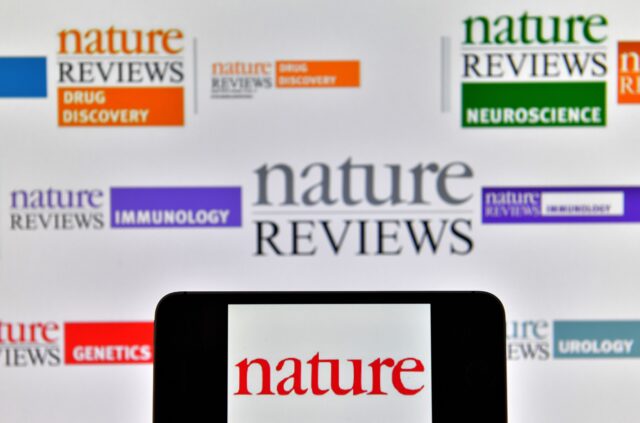- Регистрация
- 17 Февраль 2018
- Сообщения
- 38 866
- Лучшие ответы
- 0
- Reactions
- 0
- Баллы
- 2 093
Offline
The move comes after RFK Jr. called top medical journals "corrupt."


A picture taken on November 20, 2017 shows logos of English multidisciplinary scientific journal Nature displayed on computers' screens. Credit: Getty | LOIC VENANCE/AFP
Scientists at several federal agencies are losing access to scientific literature published by Springer Nature, which produces the prestigious journal Nature among many other high-profile titles.
That's according to a report Monday by Nature's news team, which is also published by Springer Nature, but is editorially independent.
According to the news outlet, spokespeople for NASA and the US Department of Agriculture (USDA) confirmed that agency scientists would no longer have access to Springer Nature journals. A USDA spokesperson said that it "has cancelled all contracts and subscriptions to Springer Nature. The journal [sic] is exorbitantly expensive and is not a good use of taxpayer funds." A government spending database also shows the Department of Energy (DOE) has dropped contracts with the publisher.
When Nature news first reached out to the National Institutes of Health (NIH)—which is the top funding agency for biomedical research in the world—it appeared that its access to Nature journals was not on the chopping block. But, hours later, Andrew Nixon, the top spokesperson for the US Department of Health and Human Services (HHS), which oversees the NIH, said: "All contracts with Springer Nature are terminated or no longer active. Precious taxpayer dollars should be [sic] not be used on unused subscriptions to junk science."
The move comes after HHS Secretary and anti-vaccine activist Robert F. Kennedy Jr. said on a May 27 podcast that prestigious medical journals are "corrupt."
"We’re probably going to stop publishing in the Lancet, New England Journal of Medicine, JAMA, and those other journals because they’re all corrupt," he said. He accused the journals collectively of being a "vessel for pharmaceutical propaganda." He went on to say that "unless these journals change dramatically," the federal government would "stop NIH scientists from publishing there" and create "in-house" journals instead.
Kennedy's criticism largely stems from his belief that modern medicine and mainstream science are part of a global conspiracy to generate pharmaceutical profits. Kennedy is a germ-theory denier who believes people can maintain their health not by relying on evidence-based medicine, such as vaccines, but by clean living and eating—a loose concept called "terrain theory."
Access to top scientific and medical journals is essential for federal scientists to keep up to date with their fields and publicize high-impact results. One NIH employee added to Nature news that it "suppresses our scientific freedom, to pursue information where it is present."


A picture taken on November 20, 2017 shows logos of English multidisciplinary scientific journal Nature displayed on computers' screens. Credit: Getty | LOIC VENANCE/AFP
Scientists at several federal agencies are losing access to scientific literature published by Springer Nature, which produces the prestigious journal Nature among many other high-profile titles.
That's according to a report Monday by Nature's news team, which is also published by Springer Nature, but is editorially independent.
According to the news outlet, spokespeople for NASA and the US Department of Agriculture (USDA) confirmed that agency scientists would no longer have access to Springer Nature journals. A USDA spokesperson said that it "has cancelled all contracts and subscriptions to Springer Nature. The journal [sic] is exorbitantly expensive and is not a good use of taxpayer funds." A government spending database also shows the Department of Energy (DOE) has dropped contracts with the publisher.
When Nature news first reached out to the National Institutes of Health (NIH)—which is the top funding agency for biomedical research in the world—it appeared that its access to Nature journals was not on the chopping block. But, hours later, Andrew Nixon, the top spokesperson for the US Department of Health and Human Services (HHS), which oversees the NIH, said: "All contracts with Springer Nature are terminated or no longer active. Precious taxpayer dollars should be [sic] not be used on unused subscriptions to junk science."
The move comes after HHS Secretary and anti-vaccine activist Robert F. Kennedy Jr. said on a May 27 podcast that prestigious medical journals are "corrupt."
"We’re probably going to stop publishing in the Lancet, New England Journal of Medicine, JAMA, and those other journals because they’re all corrupt," he said. He accused the journals collectively of being a "vessel for pharmaceutical propaganda." He went on to say that "unless these journals change dramatically," the federal government would "stop NIH scientists from publishing there" and create "in-house" journals instead.
Kennedy's criticism largely stems from his belief that modern medicine and mainstream science are part of a global conspiracy to generate pharmaceutical profits. Kennedy is a germ-theory denier who believes people can maintain their health not by relying on evidence-based medicine, such as vaccines, but by clean living and eating—a loose concept called "terrain theory."
Access to top scientific and medical journals is essential for federal scientists to keep up to date with their fields and publicize high-impact results. One NIH employee added to Nature news that it "suppresses our scientific freedom, to pursue information where it is present."
